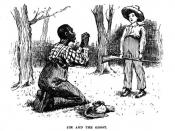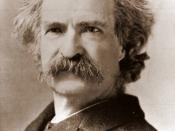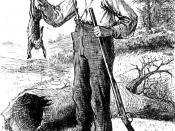Andrew Xie 10A
"The Adventures of Huckleberry Finn" is the archetypal coming of age novel. In what way is the novel "The Adventures of Huckleberry Finn" more than just about a physical journey?
"The Adventures of Huckleberry Finn", by Mark Twain, is considerably more than just a physical journey, as the protagonist of the novel, Huckleberry Finn, develops maturity and begins his coming of age process. Although the novel does describe Huck's physical expeditions, it is his lesson learnt about society and the world around him that defines the novel as what it is.
Jim, from Huck's point of view, stands as a predicament, as Huck believes he has stolen something from the Widow, but his heart dictates for him to let Jim be free. There is irony, in that Huck believes he is making an immoral decision, but actually he is treating Jim like a proper person, and being unprejudiced.
"All right then, I'll go to hell". It is these adamant words where Huck accepts the consequences of what he believes he has done, and decides to stay with Jim. But although he stands upright and decides not to inform the society that Jim is in fact a runaway slave, Huck has originally stated "Well, I did. I said I wouldn't, and I'll stick to it. Honest injun, I will." The idea of him contemplating, and almost revealing Jim uncovers the notions white society has imprinted upon Huck.
As the novel progresses, however, Huck becomes more knowledgeable and questions what society has instilled. Because of his open-mindedness and willingness to adapt, Huck sharply contrasts with Tom Sawyer. "Why, hain't you ever read any books at all? [â¦] Whoever heard of getting a prisoner loose in such an old-maidy way as that?" Perfectly summarising Tom's attitude, he affixes...


